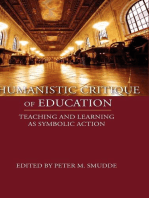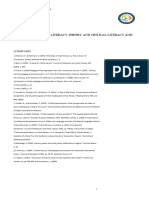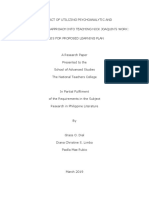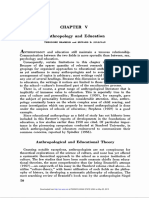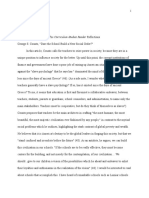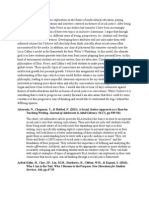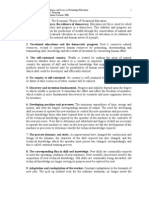The Culture of Education CJ e Book Review
The Culture of Education CJ e Book Review
Uploaded by
tender bransonCopyright:
Available Formats
The Culture of Education CJ e Book Review
The Culture of Education CJ e Book Review
Uploaded by
tender bransonOriginal Description:
Original Title
Copyright
Available Formats
Share this document
Did you find this document useful?
Is this content inappropriate?
Copyright:
Available Formats
The Culture of Education CJ e Book Review
The Culture of Education CJ e Book Review
Uploaded by
tender bransonCopyright:
Available Formats
The Culture of Education
By Jerome Bruner
Cambridge, MA: Harvard University Press, 1996. 224 pages. ISBN 0-674-17953-6
(pbk.)
REVIEWED BY MARION PORATH, THE UNIVERSITY OF BRITISH COLUMBIA
In this book of essays about education, Jerome Bruner brings his considerable experience
as a psychologist and educational theorist to bear to challenge the status quo of current
approaches to psychology and education. The book comprises nine essays that grapple
with two major themes – the need for a cultural psychology that focuses on understanding
mind in context and the implications of this approach to psychology for education.
Bruner uses education as a “test frame” for his ideas about cultural psychology. Noting
that one’s choice of test frames speaks powerfully about one’s presuppositions, Bruner
argues that, because of its interactive, communicative, and situated nature and because
teaching and learning take place outside as well as inside of schools, education is
eminently appropriate for testing a cultural psychology.
Bruner’s first essay, Culture, Mind, and Education, provides the broader
perspective within which to interpret the subsequent essays. In it, he outlines and
discusses nine tenets about the nature of mind as it functions within culture and the
educational enterprise. The tenets include: the relativity of making meaning to context,
the constraints on meaning making that result from our mental functions and symbol
systems, the constructed nature of reality, the interactional nature of education, the
“externalization” of what is learned in “works” or “oeuvres” that allow for debate and
reflection, the instrumental nature of education in the social and economic lives of
learners, the institutional nature of education, the crucial role of education in shaping
identity and self-esteem, and the role of narrative in creating a sense of personal place in
society.
In subsequent essays, Bruner elaborates on the tenets presented in the opening
essay and offers evidence and debate relevant to each. He considers how it is imperative
to understand the powerful influence of folk pedagogy in shaping teachers’ and the larger
society’s theories of children’s minds and classroom practice. He describes successful
educational projects – “enabling cultures” – that exemplify meaning making through
knowledge constructed (rather than “received”) in collaborative, communal settings that
respect the culture in which they are situated. He grapples with questions of what
constitutes “curriculum,” what it means to understand and explain others’ minds, and
what it means to “know something.” The book’s major foci are the disciplines of
psychology and education; however, these foci are enriched by the inclusion of points of
view from anthropology, sociology, literature, philosophy, and science. This
interdisciplinary perspective contributes to the goodness of fit between Bruner’s notions
of a cultural psychology and the resulting educational implications. It is the scope of his
thinking about education and its role in contemporary society that makes this book one
that anyone concerned with education should read.
This collection of essays offers a number of “wake up calls” to education. Bruner
emphasizes the importance of intersubjectivity – “how people come to know what others
have in mind and how they adjust accordingly” (p. 161) – to successful developmental
and educational outcomes. Life requires that we all be psychologists, and this capability
is part of being an educated person. Bruner’s emphasis on intersubjectivity echoes
others’ recognition of the importance of empathic understanding and interpersonal ability
in ensuring stability in our increasingly complex communities (e.g., Eisenberg, 1992;
Keating, 1995). This importance results in the need to give “human studies” (social
studies, history, and literature) a legitimate, prominent place in education. Related points
include a call to replace the emphasis on global achievement status with one on
meaningful early education, consideration of the role of the teacher in a learning culture,
and debate about standards in education. What truly matters in school and societal
reform – science and mathematics scores or wisdom and philosophical depth gained
through a narrative mode of meaning making? These fundamental issues are presented in
a balanced fashion. Bruner notes the danger in “either-or” positions, acknowledging, for
example, that there are places in education for a computational model of mind and the
fostering of scientific and mathematical expertise. What he argues is that in considering
what matters, it is equally, and possibly more, important to emphasize the understanding
of self and others in the aims of education.
Bruner notes that he does not confront educational politics. Although his book
offers many rich opportunities for him to engage in such confrontation, his position is
that we must achieve a deep understanding of the culture of education before we attempt
to resolve political issues. Given contemporary debates about school reform,
performance standards, and teacher education reform, Bruner’s call for contemplation of
fundamental questions about why and how we educate is a vital one. Moreover, in
thinking about what it means to be an educated citizen in a knowledge society, one must
grapple with the nature of knowledge and the importance we ascribe to different forms of
knowledge. As Bruner points out, in guiding educational reform, we must have clear
directions and face the question of what kind of people we want to be. The Culture of
Education is a book that challenges us to get to the heart of the matter of education in
deep and thoughtful ways.
References
Eisenberg, N. (1992). The caring child. Cambridge, MA: Harvard University Press.
Keating, D. P. (1995, June). Building the learning society: Education’s critical role.
Invited address, Canadian Society for the Study of Education, Université de
Québec à Montréal.
You might also like
- Humanistic Critique of Education: Teaching and Learning as Symbolic ActionFrom EverandHumanistic Critique of Education: Teaching and Learning as Symbolic ActionNo ratings yet
- Nurture That Is Christian: Developmental Perspectives on Christian EducationFrom EverandNurture That Is Christian: Developmental Perspectives on Christian EducationRating: 3.5 out of 5 stars3.5/5 (4)
- Jerome Bruner's Theory of Education: From Early Bruner To Later BrunerDocument20 pagesJerome Bruner's Theory of Education: From Early Bruner To Later BrunerranadeyNo ratings yet
- The Culture of Education: Student Name Professor Course DateDocument4 pagesThe Culture of Education: Student Name Professor Course DateEdward Mwendwa MalitaNo ratings yet
- Jerome Bruner's Theory of Education: From Early Bruner To Later BrunerDocument2 pagesJerome Bruner's Theory of Education: From Early Bruner To Later BrunerRadika WidiatmakaNo ratings yet
- Sin Autor - brunER Resumen InglésDocument7 pagesSin Autor - brunER Resumen InglésJorge Eduardo CanoNo ratings yet
- A Study On Ensuring Holistic Education in Community by Participatory ApproachDocument10 pagesA Study On Ensuring Holistic Education in Community by Participatory ApproachrajeshsamodajatNo ratings yet
- Taylor & Francis, LTDDocument11 pagesTaylor & Francis, LTDJosé Félix Angulo RascoNo ratings yet
- How Do Children Socially Learn From Narrative Fiction: Getting The Lesson, Simulating Social Worlds, or Dialogic Inquiry?Document31 pagesHow Do Children Socially Learn From Narrative Fiction: Getting The Lesson, Simulating Social Worlds, or Dialogic Inquiry?Sophia SernaNo ratings yet
- Teaching Empathy For Others Through Young Adult LiteratureDocument49 pagesTeaching Empathy For Others Through Young Adult LiteraturesadiaNo ratings yet
- Ped3 DocsDocument7 pagesPed3 Docskristineesteban16No ratings yet
- Jerome Bruner and The Process of Education: EncyclopaediaDocument6 pagesJerome Bruner and The Process of Education: EncyclopaediaYusnia NoumyNo ratings yet
- Mini Paper 4 - Moral and Ethical Implications To InclusionDocument8 pagesMini Paper 4 - Moral and Ethical Implications To Inclusionsjy7232023No ratings yet
- Towards A Posthuman Theory of Educational Relationality (Simon Ceder)Document234 pagesTowards A Posthuman Theory of Educational Relationality (Simon Ceder)Zain SalamNo ratings yet
- Krummheuernarrative Elements of Children's ArgumentationsDocument9 pagesKrummheuernarrative Elements of Children's ArgumentationsoscarguerrerocNo ratings yet
- Lit Review 3 FinalDocument13 pagesLit Review 3 Finalapi-289511293No ratings yet
- Philosophy of Education Paper SsDocument6 pagesPhilosophy of Education Paper Ssapi-310218757No ratings yet
- Chapter Three Pedagogies in Higher EducationDocument15 pagesChapter Three Pedagogies in Higher EducationNurhalimah FebriantiNo ratings yet
- Critical ConstructivismDocument15 pagesCritical ConstructivismMariana MirelaNo ratings yet
- Research-in-Phil.-Lit. WOODocument20 pagesResearch-in-Phil.-Lit. WOODiana Christine Sena LimboNo ratings yet
- Education 10 The Teaching Profession Assignement#2 1. John Dewey (1859Document3 pagesEducation 10 The Teaching Profession Assignement#2 1. John Dewey (1859Kenneth FlorescaNo ratings yet
- Anthropology and EducationDocument10 pagesAnthropology and Educationsilvianeagu0% (1)
- Comparison and Analysis of Vygotsky and BrunerDocument2 pagesComparison and Analysis of Vygotsky and Brunernisay_life2255No ratings yet
- Reconciliation, Contructvism, and Ecological Sustainability A Review EssayDocument9 pagesReconciliation, Contructvism, and Ecological Sustainability A Review EssayDaniela UrreaNo ratings yet
- Analytic ReadingDocument24 pagesAnalytic Readingbersam05No ratings yet
- Essentialism & PerennialismDocument7 pagesEssentialism & PerennialismDihays Damha100% (2)
- I Saw The Universe and I Saw The World eDocument17 pagesI Saw The Universe and I Saw The World eAzhar ForhadNo ratings yet
- Major of Foundations of CurriculumDocument46 pagesMajor of Foundations of CurriculumJuvince BuenoNo ratings yet
- Brains Inventing ThemselvesDocument61 pagesBrains Inventing ThemselvesGiovane V. Zandonai Schmauch100% (1)
- Perennialism Tugasan 1 FalsafahDocument6 pagesPerennialism Tugasan 1 FalsafahAdliezan Rosman100% (1)
- Alterity and Dialogical Education A Path To Education in Strange Times - 1684309123Document4 pagesAlterity and Dialogical Education A Path To Education in Strange Times - 1684309123luisa garcesNo ratings yet
- BrunerDocument34 pagesBrunerArindam RoyNo ratings yet
- Book Review of Teaching As A Subversive ActivityDocument15 pagesBook Review of Teaching As A Subversive ActivityAmit KumarNo ratings yet
- Key Aspects of Learner Centered IdeologyDocument7 pagesKey Aspects of Learner Centered Ideologyapi-346211345No ratings yet
- Conceptual Territories Interdisciplinarity - Dominique Van GilstDocument5 pagesConceptual Territories Interdisciplinarity - Dominique Van Gilstapi-736221333No ratings yet
- Joanne Marie PurcellDocument20 pagesJoanne Marie Purcelldoraszujo1994No ratings yet
- Philosophical Perspectives in EducationDocument2 pagesPhilosophical Perspectives in EducationRoselle Ann Canindo Hugo100% (1)
- Essentialism/PerennialismDocument14 pagesEssentialism/Perennialismra s100% (1)
- A Study of J. Krishnamurti's Philosophy of LifeDocument15 pagesA Study of J. Krishnamurti's Philosophy of LifeheretostudyNo ratings yet
- Assignmet #2 For Teaching ProfessionDocument8 pagesAssignmet #2 For Teaching ProfessionKal Buenaflor100% (2)
- Humanistic Approaches' To Language Teaching: From Theory To PracticeDocument34 pagesHumanistic Approaches' To Language Teaching: From Theory To PracticesoksokanaNo ratings yet
- Essentialism in Philosophy, Psychology, Education, Social and Scientific ScopesDocument12 pagesEssentialism in Philosophy, Psychology, Education, Social and Scientific ScopesAnatasia LeticiaNo ratings yet
- Critical LiteracyDocument10 pagesCritical Literacyapi-231971962No ratings yet
- The Curriculum Studies Reader ReflectionsDocument11 pagesThe Curriculum Studies Reader Reflectionsapi-382124929No ratings yet
- Pedagogy For Restoration Addressing Social and Ecological Degradation Through Education 2nd Edition Krzesni 2024 Scribd DownloadDocument62 pagesPedagogy For Restoration Addressing Social and Ecological Degradation Through Education 2nd Edition Krzesni 2024 Scribd Downloadtikelojedyna100% (2)
- Philosphy of EducationDocument3 pagesPhilosphy of EducationrahmatNo ratings yet
- Jerome Bruner TheoryDocument6 pagesJerome Bruner TheorybalasajoNo ratings yet
- Emancipatory Pedagogy in PracticeDocument12 pagesEmancipatory Pedagogy in PracticeMaría Rodríguez GutiérrezNo ratings yet
- Normative Theories of EducationDocument27 pagesNormative Theories of EducationHanah MocoyNo ratings yet
- Content ServerDocument9 pagesContent Serverjoselyn tigreNo ratings yet
- Interreligious Educational DiscourseDocument29 pagesInterreligious Educational DiscourseRiza MuhammadNo ratings yet
- Stories of Experience and Narrative InquiryDocument14 pagesStories of Experience and Narrative InquirySullyvan GarciaNo ratings yet
- Watson 2016Document14 pagesWatson 2016Ema BrajkovicNo ratings yet
- Zajda Constructivist PedagogyDocument10 pagesZajda Constructivist Pedagogyapi-279926044No ratings yet
- Education and Life's MeaningDocument21 pagesEducation and Life's MeaningReza MohammadiNo ratings yet
- Linking Children's Literature With Social Studies in The Elementary CurriculumDocument13 pagesLinking Children's Literature With Social Studies in The Elementary CurriculumOscar Santiago VélezNo ratings yet
- Critical Pedagogy A Journey From Its Origins To CRDocument15 pagesCritical Pedagogy A Journey From Its Origins To CRrogueslayer2022No ratings yet
- Revised Interdisciplinarity EssayDocument6 pagesRevised Interdisciplinarity Essayapi-609384507No ratings yet
- E 4 ResearchDocument5 pagesE 4 Researchapi-276665265No ratings yet
- American Educational Research Association Educational ResearcherDocument14 pagesAmerican Educational Research Association Educational ResearcherVictor BirknerNo ratings yet
- COT LP in English Quarter 3 Module 4Document5 pagesCOT LP in English Quarter 3 Module 4Gie-Ann OliverosNo ratings yet
- PhysicsDocument405 pagesPhysicsBaskaranNo ratings yet
- Cone of Experience (1946) Was The Most Important Contribution of Edgar Dale in Field ofDocument3 pagesCone of Experience (1946) Was The Most Important Contribution of Edgar Dale in Field ofAlfredo T. BakiaoNo ratings yet
- L2 - English Lesson FormatDocument21 pagesL2 - English Lesson FormatMajdoline Sadeddine0% (1)
- Reference Letter 3rd Grade TeacherDocument2 pagesReference Letter 3rd Grade Teacherapi-517941920No ratings yet
- Plan For A Listening Activity Y6 - SampleDocument2 pagesPlan For A Listening Activity Y6 - SampleJosh UlakNo ratings yet
- Exam Prof Ed Part 7 and 8Document10 pagesExam Prof Ed Part 7 and 8Dam100% (1)
- 12 Tips para Renovación CurricularDocument8 pages12 Tips para Renovación CurricularNAYITA_LUCERONo ratings yet
- The Economic Theory of Vocational EducationDocument6 pagesThe Economic Theory of Vocational Educationkatonyo100% (1)
- Paradigm Shift - Teacher-Centered To Learner-Centered TeachingDocument7 pagesParadigm Shift - Teacher-Centered To Learner-Centered TeachingCarina Margallo CelajeNo ratings yet
- Common Charter School Application FinalDocument2 pagesCommon Charter School Application FinalGothamSchools.orgNo ratings yet
- ConsultationDocument2 pagesConsultationPrincess Shaira BonifacioNo ratings yet
- AlagappaDocument2 pagesAlagapparajanikanthNo ratings yet
- DLP Lesson - 2Document6 pagesDLP Lesson - 2Norlailah DiamonganNo ratings yet
- Andrea Parks Literacy Narrative Mla FormatDocument3 pagesAndrea Parks Literacy Narrative Mla Formatapi-643468438No ratings yet
- DLP - English 9 - 24Document6 pagesDLP - English 9 - 24Jorex CampulinNo ratings yet
- PGP Part 1Document4 pagesPGP Part 1api-707646304No ratings yet
- Schools Division of Puerto Princesa CityDocument1 pageSchools Division of Puerto Princesa CityMALOU ELEVERANo ratings yet
- Lesson Plan DribblingDocument5 pagesLesson Plan Dribblingapi-400748984No ratings yet
- Emerging Trends On Training and DevelopmentDocument20 pagesEmerging Trends On Training and DevelopmentSomnath Nayak100% (1)
- LESSON 6 Modes of DeliveryDocument31 pagesLESSON 6 Modes of DeliveryEdrianne Ranara Dela RamaNo ratings yet
- Assure ModelDocument12 pagesAssure ModelApril Jean L. DemonNo ratings yet
- Alternative Learning System 1Document20 pagesAlternative Learning System 1Curt Adrianne AbraciaNo ratings yet
- Grade 2 - Papaya (Day1 and 2)Document8 pagesGrade 2 - Papaya (Day1 and 2)ClaudNo ratings yet
- Critique PaperDocument2 pagesCritique Papermaris100% (1)
- Lesson Plan in Values EducationDocument3 pagesLesson Plan in Values EducationEdwin Beltran Muje Jr.No ratings yet
- Lesson 1 - A Special Type of MixtureDocument5 pagesLesson 1 - A Special Type of Mixtureapi-427880292No ratings yet
- Product PrototypeDocument4 pagesProduct PrototypeDavid John Anfone BacayoNo ratings yet
- Production + DiaryDocument5 pagesProduction + Diaryapi-293470899No ratings yet
- LESSON PLAN-DEPED Semi DetailedDocument2 pagesLESSON PLAN-DEPED Semi DetailedMaria Nacawili100% (2)
